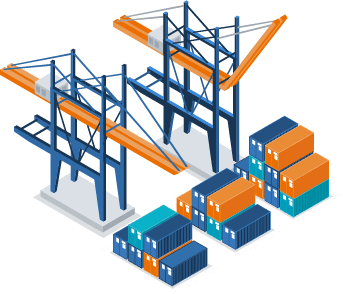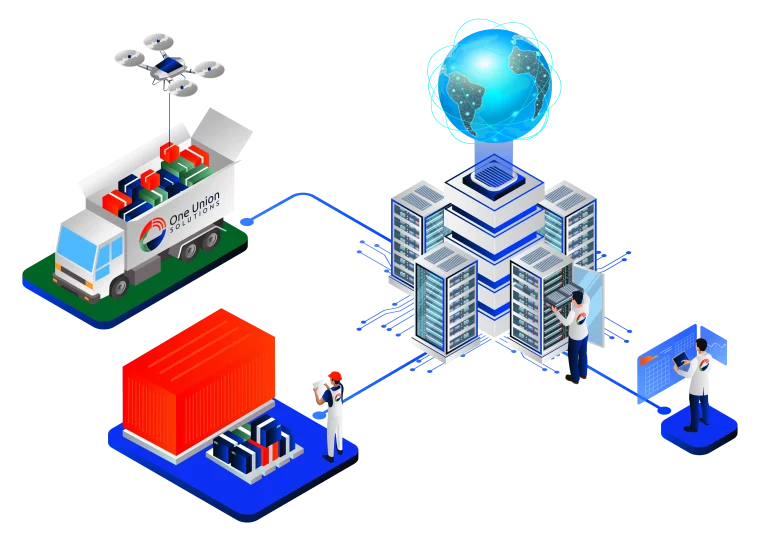Your Trusted Partner for Exporter of Record Services in South Africa
However, One Union Solutions isn’t just an IOR for IT and tech deployments; we’re also an Exporter of Record Service that takes care of everything you need for hassle-free international shipping, including real-time tracking and visibility into your exports progress. Compliance with South African customs regulations and requirements is our responsibility, ensuring a smooth export process.
Shipping IT & Telecom Equipment to South Africa Diverse Industries
IORs make sure imported goods comply with South African laws and regulations. Getting all the right certificates and licenses, paying the right taxes, and following trade rules are all part of this. It’s important to consider several factors when importing IT and telecom equipment to South Africa. The first step is making sure your equipment meets the requirements set by the South African Bureau of Standards (SABS) and the Independent Communications Authority of South Africa (ICASA).
Depending on what you’re importing, you might need to get extra permits or certifications. Besides taxes, there are several duties and taxes to consider when you import IT and telecom gear. Taxes on imported goods are 15% in South Africa, which must be paid when they’re imported. Also, customs duties may apply, depending on what type of equipment you’re importing.
The following are the specific shipping requirements and considerations for tech, medical, automotive, and aviation equipment:
Tech Industry:
The equipment you import needs to meet SABS and ICASA requirements, have certifications and permits, and abide by regulations like the Privacy Protection Act (POPIA) and Cybercrimes and Cybersecurity Act when it comes to data privacy and protection.
The equipment should meet safety and quality standards, comply with intellectual property laws, be marked correctly in customs to determine customs duties, and be aware of end-user restrictions if you’re importing IT or telecom equipment.
With an experienced IOR provider, you can make sure your import process runs smoothly and compliantly, regardless of your industry.
Medical Industry:
The process of importing medical equipment into South Africa is complicated and requires compliance with regulatory bodies like SAHPRA and MCC. They also require medical equipment to be registered with them, along with permits and certifications. Also, you might have to pay customs duties, so you have to use the right tariff codes. In addition to rigorous testing, medical equipment must comply with South African regulatory requirements. Some may need a local rep to make sure they’re in compliance. The proper storage and handling of medical equipment is also important. If you work with an IOR service provider who knows the South African medical industry, you’re more likely to have a smooth and compliant import.
Automotive Industry:
AfCFTA and SACU (South African Customs Union) are both free trade areas that enforce international trade agreements and regulations when importing IT and telecom equipment into South Africa’s automotive industry. There are also strict safety and quality standards that apply to this industry. There might also be customs duties and restrictions on end-use for some equipment. Working with a local IOR service provider and having a local representative can help make compliance and regulatory issues go smoothly.
Aviation Industry:
As well as being aware of the CAA and ATNS, importers of IT and telecom equipment to South Africa’s aviation industry need to pay attention to the International Air Transport Association (IATA) regulations for medical, tech, aviation, and automotive equipment, As well as meeting strict technical standards for reliability, durability, and resistance to harsh environmental conditions, aviation industry equipment has to be reliable. Compliance with all regulations and standards can be ensured when you work with a good IOR company like One Union Solutions.
South Africa has a lot of regulations, certifications, and trade rules that could make importing IT and telecom equipment complicated. Every requirement must be met and all necessary permits and certifications must be obtained by the IOR. Understanding the specific regulations and standards of the industries you’re importing into is essential to avoiding potential issues and delays. Partnering with us will help you navigate these complexities, minimize uncertainties, and streamline your import process, allowing you to focus on your core business activities.


